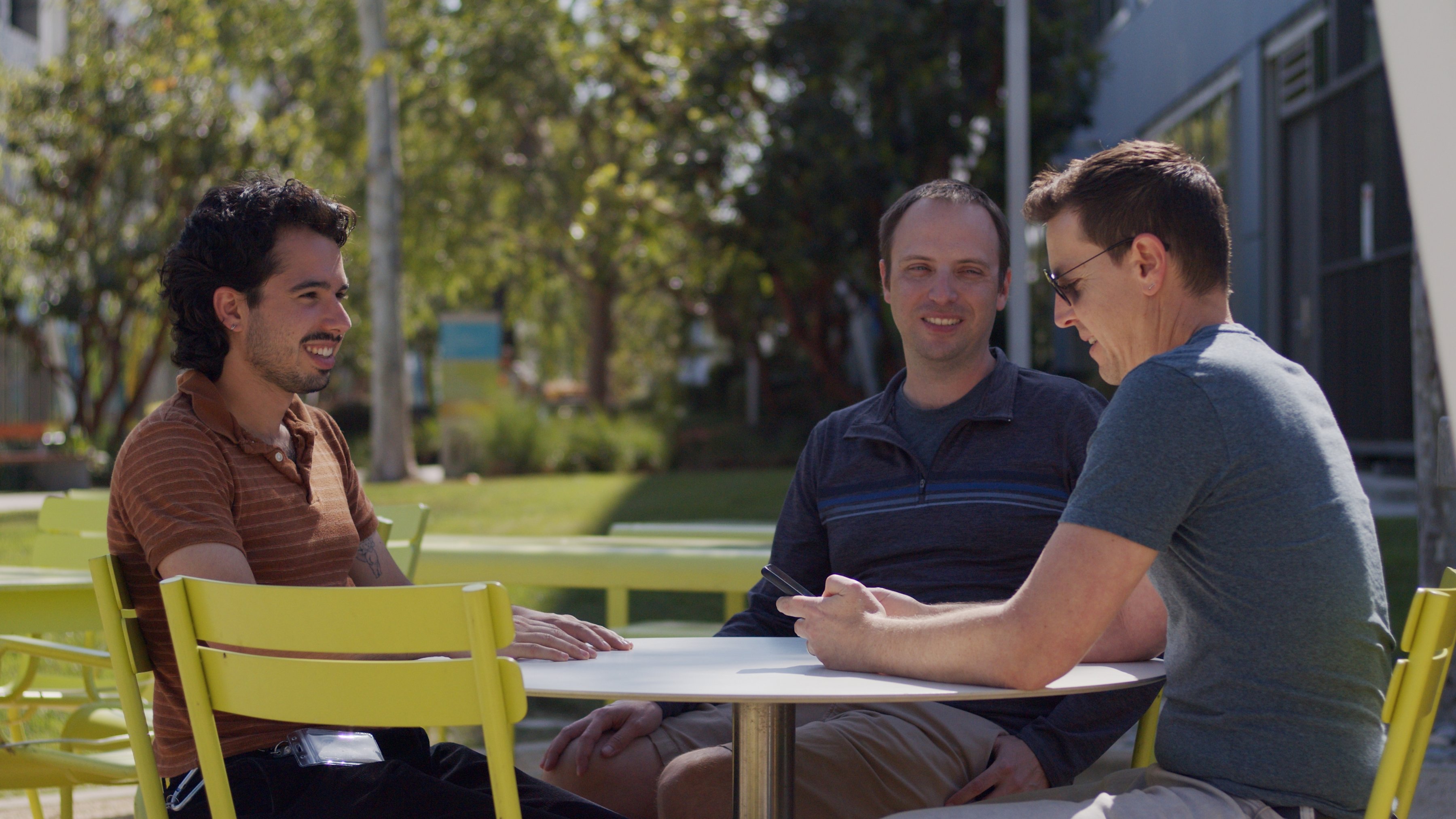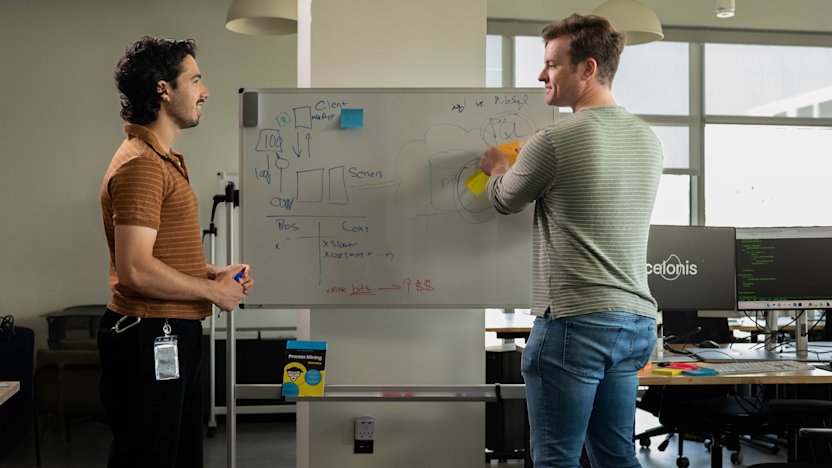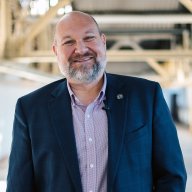
Engineering an environment where software developers grow, thrive and make a difference
Creating software that makes people’s lives better. That’s why Aaron Girard, a software engineer at Celonis and graduate of Emory University, became a developer. And, it’s one of the reasons he joined the process mining and execution management company’s engineering team. Girard wanted to make a real impact for users and not just tinker around the edges of a stale product.
“[As a Celonis engineer] you're not just working on the 1001th feature for this product that's been released for a long time that maybe 1% of the user base will use,” Girard told me. “You're going to be working on something that is pretty core to the product and the user experience. And that is super cool.”
I had the opportunity to speak with Girard while visiting the Celonis Los Angeles office, located in Silicon Beach. He shared with me why he became a software engineer, how he and the Celonis team are designing easy-to-use UIs for complex business processes and what makes Celonis a place where engineers can grow and thrive.

The following is a transcript of the interview edited for readability.
Building apps that make people’s lives easier
Bill Detwiler: So Aaron, what made you want to become a software engineer?
Aaron Girard: I went into college thinking I was going to study politics or something completely different. And I just took a CS class one semester, and it was my favorite thing. I was good at it. And it was really fun. And I stuck with it.
Bill Detwiler: What was the first line of code you remember writing?
Aaron Girard: It was probably some Hello, World! program in my first CS class or something like that. I didn't really do too much before getting into the computer science department at school. But I still remember some of the first programs I wrote, which were something like silly things.
For example, I wrote a small app that allowed me to sign people up on a list and send them a text message every morning with a dad joke and the weather from their zip code. And it really showed me how you could build small, simple things, and affect people's lives, and bring a little bit of joy and happiness. And even though it's small, it was a lot of fun and is still the thread that runs through why I do software engineering today.
If you build something and it makes someone's life easier, that's awesome.
Bill Detwiler: So it gave you that immediate feedback. And it puts something that you built out there that people could use and get value from.
Aaron Girard: Totally. In economic terms, it would be utility, right? I think anything that I build that brings a positive utility in someone's life makes me happy. I mean, the worst thing is building something and no one uses it, right? That kind of sucks. But if you build something and it makes someone's life easier, that's awesome. It makes me feel really good.
Building enterprise software the drives efficiency
Bill Detwiler: What do you like most about the work you're doing now?
Aaron Girard: Yeah, I mean, I think it has a lot to do with exactly that. Celonis' value proposition to its customers is that you can spend money with us, and you'll save even more money. So if I came to you and I said, "I'll give you $10 or you give me $10, and you'll save $20." You'd probably take it. And that's Celonis in a nutshell, right? And that's what we're building.
We're building tools to help people have a lot of success in their jobs. And that's also where the complexity comes in is that we're coming into these spaces where people have a lot of data, and we're trying to drive insights from it, and distill that down to usable, actionable things that they can use to save money or what have you. And that's really awesome.
Bill Detwiler: Yeah. It really comes down to driving that efficiency. Helping people be better at their jobs.
Aaron Girard: Exactly.
Celonis Engineering Blog: Handling API errors with Problem JSON
Tough technical challenge: Distilling business complexity into a simple, easy-to-use UI
Bill Detwiler: What are some of the toughest and most interesting technical challenges that you're working on right now?
Aaron Girard: Yeah, I would say it goes back to that same thing of distilling complexity into simple, easy to understand UIs. For example, at a really high level, a lot of what we do is... Every business creates a massive data in their operations. And our tools try to make sense of it, right? And try to make sense of it in a way that is really useful to people, which is a very hard problem. And that is what we are trying to solve.
We want someone to be able to log into the account, click, and see something that they can be like, "Oh, if I call out this vendor of mine, we could fix the problems they're having, and see those problems early." And to get to that point though is very hard. And there's a lot of stakeholders that you have to work with and complexities at many levels that you're tackling every day.
Celonis Excellence in Engineering
Excellence in Engineering Leadership: The best piece of advice I was ever given
Celonis software engineer shares secrets of building enterprise apps with consumer scale
Engineering enterprise apps that become essential tools for every user
Bill Detwiler: And it makes the job exciting because it was easy, if it was just something that was sort of repetitive, it wouldn't have that same sense of accomplishment at the end once you climb that mountain, right?
Aaron Girard: Exactly. Almost every day I go in, and there's something else I'm thinking of, something I need to consider, and that just adds a lot of interest and intrigue to the job.
Celonis has an environment where engineers can grow and thrive
Bill Detwiler: Yeah. So how did your previous experiences help prepare you to solve tough technical challenges like the one you described?
Aaron Girard: Yeah. Previous to working here, I worked at larger companies. And coming up as a software engineer, that was a great place to be to learn a lot, and be around a lot more senior people, and being around processes and institutions that were long lasting and in place, and you glean a lot. And now at Celonis, I get to take that experience, and really apply it, and have a lot of agency and responsibility. And there's no better way to grow than just by doing, so that's going to be really awesome.
We want to foster an environment where engineers can come in, and grow, and really thrive, and be able to be constantly developing their skills, and tackling new challenges. We have so much work to do that there is always opportunity and work to do.
Bill Detwiler: Yeah. I think that's a really good point that you make that we have so much work that we want to do that there's always a new challenge. There's always a new product to work on. There's always a new feature to work on as opposed to, hey, we're working with a very mature process and platform that we're making small changes.
Aaron Girard: Yeah. And what's even more exciting about that, exactly that, is that you're not just working on the 1001th feature for this product that's been released for a long time that maybe 1% of the user base will use, but you're going to be working on something that is pretty core to the product and the user experience. And that is super cool.
Bill Detwiler: Yeah. The work you do has massive impact.
Aaron Girard: Yeah.
Bill Detwiler: So how do you work with the rest of the team? How does the team work together to solve those tough challenges?
Aaron Girard: Yeah. The team is super collaborative. If I'm given a problem to solve, I tackle it, bang my head against it for a little bit. And if I ever want to talk about it, I can just come back to the team, and just strike up a conversation. It's relatively informal in the office. If you want to talk about something, you just tap someone on the shoulder, and talk about it, put it on the whiteboard, work through it.

Celonis engineers Aaron Girard (left) and Alex Monroe (right) working at the company's LA engineering hub.
In my experience, at least, that's the best way to figure things out in that process where you're just talking. Sometimes just talking out loud, you learn so much just by verbalizing and making things kind of real, even if you're just spinning it in your head, just getting it out there, and talking it back and forth with someone. They could think of something that you weren't thinking of and you just bounce about ideas off of each other.
Bill Detwiler: And getting that spark, getting that little bit of feedback helps a lot in being able to bounce things back and forth right?
Aaron Girard: Yeah, it helps so much.
Aaron’s advice for new software engineers
Bill Detwiler: And so what one or two pieces of advice would you give to new engineers to help them solve tough technical challenges?
Aaron Girard: Yeah. I'd say first, just be ready to learn, right? Because coming out of school, you have a lot of good skills, but you don't have a lot of the day-to-day know-how of how to actually build good software. And it's not rocket science, but it takes practice, it takes experience, and has some really interesting problems. And so, just being around, trying to find a place where you're around people who have this knowledge, and kind of guide you, and help you get there, it would be a great first step.
And then, I would also say, try to find some place where you can work on something that you're super excited about, because that helps so much. If you're passionate, that will come through in your work, and you'll probably have better ideas. You'll feel better about going into work every day.
Join the Celonis team in LA or around the world
At Celonis we’re building a new type of enterprise technology, called execution management. And, we’re recruiting the world’s best engineers to do it. Whether you’re a frontend or backend developer, full stack engineer, data scientist, DevOps specialist, QA analyst or engineering leader – we have technical challenges that need solving.
To learn more about how we’re pioneering advances in AI, machine learning, automation, analytics and data mining, and to see current engineering job openings, visit Celonis Engineering.



